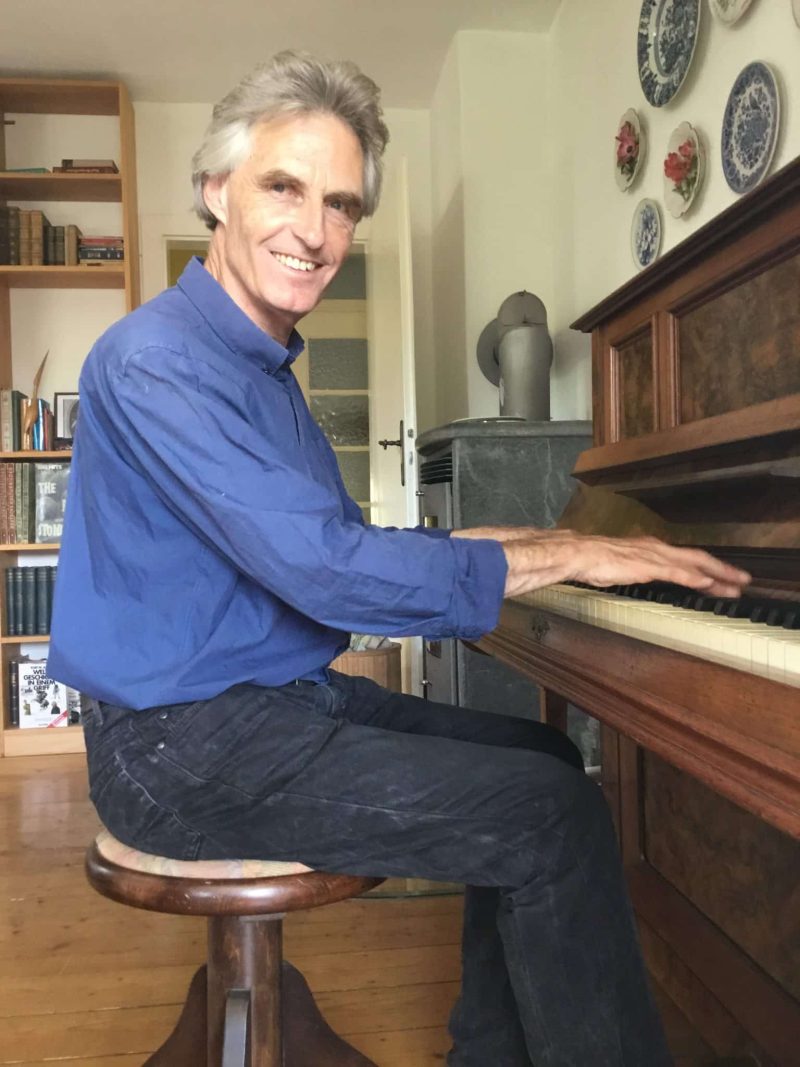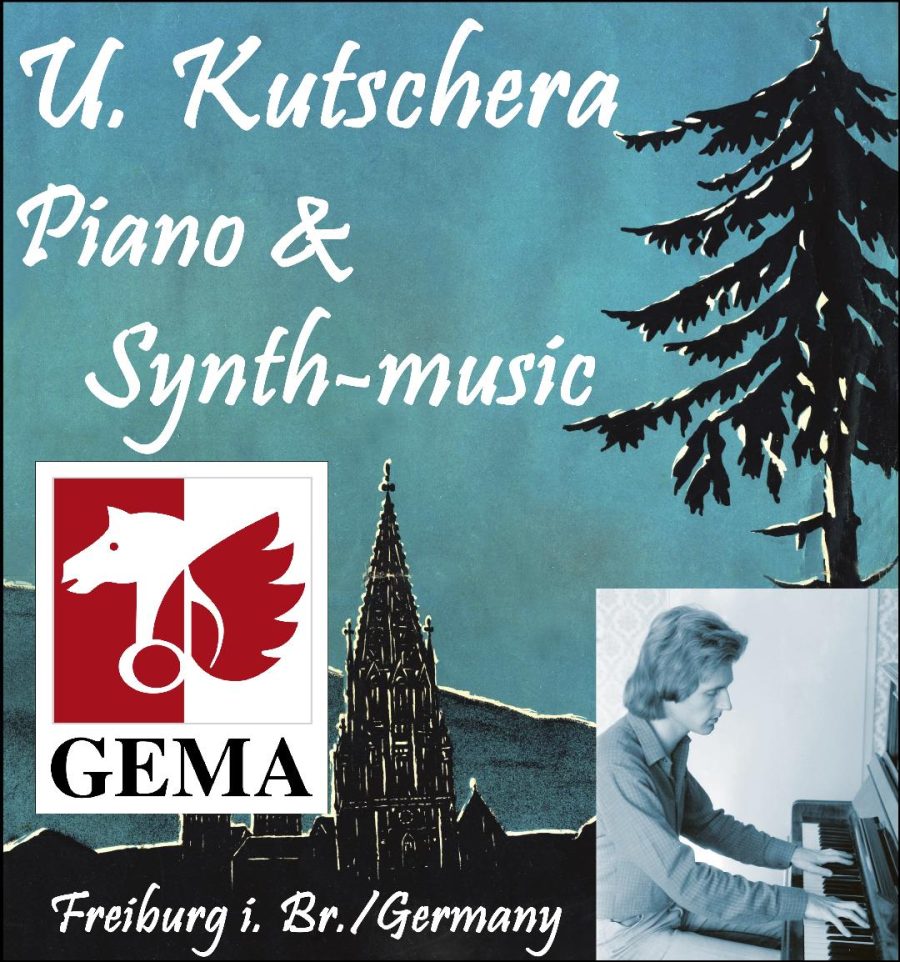We had met Professor Ulrich Kutschera earlier with interviews about Corona and Science /Political Correctness. This time we want to get to know him as a musician. It was also necessary and important to discuss with him the importance of classical music and the influence of Artificial Intelligence (AI).

Few people have multiple talents, and some of them develop creative activities. I want to present you one example of this rare group of innovators: Ulrich Kutschera, an evolutionary biologist, author & composer (www.evolutionsbiologen.de). His Piano-Synthesizer-Prog.Rock music is available on five Compact Discs (CD) that have been reviewed & played on “Stanford Radio“, and they are distributed worldwide via “Compact Disc Services-UK“. Recently, Kutschera’s music was also released on Streaming Platforms such as Spotify, Amazon Music and Deezer etc.
He has been playing piano since his early childhood and continued his musical engagement beside his academic career. In this Interview, we discuss his career and the Power of Music with respect to health and human well-being.
Interview with Ulrich Kutschera
You are an evolutionary biologist & research professor working in California and Germany, and you are also a musician/composer: How do they fit together?
U. Kutschera: When I was 9 years old, I had my first piano lessons. Three year later, I started to collect animals (salamanders, lizards etc.) in the nearby forests and ponds of the Black Forest in Freiburg , where we lived. Hence, animal biology and music became the passions of my life, which have lasted until today. However, the conservative, Mozart-loving piano teacher hired by my parents always complained about the fact that I had the tendency to improvise, and not to play exactly what was written down by Mozart and the other composers, i.e.; perfect music, composed of rhythm, melodies and a harmonic background.
As a young biologist, I likewise “improvised” by setting up custom-made aquaria and terraria for my “pets” that I raised in captivity and studied throughout the day and night. Hence, I spend numerous hours performing classical music and watching animals. This was the beginning of my career as naturalist-plus-musician. In addition, at age 13, I started to write down my thoughts and observations on biology & music. I still have these illustrated Notes in my files.
You began to play the piano at the age of 9? Today, the kids prefer to play with their smart phones. What do you think?
U. Kutschera: This is a difficult question. In my case, after a four-year-period of piano instructions, I did not want to continue to interpret Mozart, Haydn and Clementi according to the lessons of my music teacher. Rather, I continued to play the Guitar! Nevertheless, I continued to practice at the piano, and my self-discipline was one of the key ingredients of my success.
Today, cell phones provide immediate pleasure for kids and adults alike, and music is available on Streaming Platforms etc., so that it is no longer necessary to learn to play an instrument. This is problematic, because playing piano leads to knowledge as to how music was created and written down by the great composers of the past. This fundamental cultural background is more and more lost by younger generations, who are only passive, but no longer active music lovers.
How did you learn to compose and write down your own music?
U. Kutschera: When I was 18 years old, I took advanced piano lessons, and the new teacher discussed with me the structure of complex compositions of Bach, Schumann, Tchaikovsky, Mussorgsky etc. I started to write down my piano improvisations, and, as a student of Biology & Chemistry at the University of Freiburg, I also attended lectures and performed practical exercises in music theory. These studies, notably the practice of writing musical scores, honed my skills, so that I became independent of instructors and was able to compose piano pieces that I wrote down; I still have these early documents of musical creativity in my files. Today, I record my compositions in a professional studio, with the help of an excellent producer.
Is classical music outdated today? Most young people have no connection to Mozart and Beethoven, they prefer Rammstein etc.
U. Kutschera: In my opinion, to understand the unique quality of classical music requires knowledge about the structure of classical music. This is the best achieved by learning to play an instrument during early youth, with an understanding of the value of classical music. Since only a tiny fraction of young people have the gift and discipline to become an active musician, with an understanding of classical music, the majority prefers simple pop songs. This is a fact we can and should not deny. Classical music is well and alive today, at least in the hearts of a minority of music players lovers, like me.
How would you classify your own music: Progressive-Rock, Neo-Classics? Your compositions & performances sound to me like a mixture of Classical work and Rock music.
U. Kutschera: Due to my classical background, and my love for the music of Bach, Haydn,
Mozart, Beethoven, Hoffmann, Schumann, Brahms, Tchaikovsky I create (mostly rhythmic) Progressive Rock-music, influenced by these great composers. As an example, I want to refer to my CD-Nr. 5, just out on Spotify, “Requiem for E.T.A. Hoffmann”, 10 tracks arranged as a Suite for Piano & Synthetic orchestra.
However, on earlier CDs, I have also recorded tracks in a more ambient style, i.e., romantic piano-pieces or rhythmic synthesizer-work; always with lovely melodies and harmonies.
Artificial Intelligence may soon replace parts of thinking by humans, and also the composition/performance of music. Don´t you think?
U. Kutschera: Music comes from the heart or soul of the composer, it reflects his mood or experiences, and this “substance” of real creative musical work cannot be replaced by a computer. In short, I think that Artificial Intelligence will not be successful in the “world of serious music”, Prog.-Rock and Classics alike. The human being with its feelings is irreplaceable, when it comes to high-quality music, and this rule not only applies to compositions, but also to performances.
Music has actually an healing power for our body and soul. You should check American Music Therapy Association (AMTA)‘s website. It is there wery well explaind how important the music for humanbeing is.
Music has healing power. How can you explain this from an evolutionary perspective?
U. Kutschera: This is a big topic on which I can only briefly comment. During human evolution, over the past 2 million years, members of our species have always reacted to sounds from the environment; warning signals, calls of other group members etc. As a result, music-like sound combinations, based on rhythms, developed, and this proto-music (a language which communicated emotions in the same way, but about real things) was important for group solidarity. Today, we know that music has healing power, as documented in numerous scientific studies; it is beneficial for body and soul!
You are called “Ulrich Kutschera- The Prog.-Rock-Piano-Synth.-Evolutionist”. Sounds strange to me!
U. Kutschera: Yes, indeed. When I discovered this description of my activities as an evolutionary biologist & musician-composer on the Internet, I thought this is a clever slogan! Progressive Rock music, such as the splendid early work of the British Band “Genesis”, forms one of the inspirational bases of my compositions; plus the classical melodies I design under the influence of the great composers mentioned above, which are the core of my art of arranging rhythm, harmony & melodies to create novel piano-pieces.
Thousands of tracks are available via Spotify etc. Why do you continue to compose, perform and record music? Is there not enough music available online and on CDs?
U. Kutschera: Good question! When Johannes Brahms (1833–1897) started to compose his first Symphony, around 1862, he complained about the fact that it is impossible to create something new in the wake of Beethoven’s compositions in this genre. However, finally he composed four splendid Symphonies, which are still alive today. Five decades earlier, E.T.A. Hoffmann composed excellent chamber music, despite the fact that he was very much impressed by Mozart’s achievements he praised in the highest tones!
I do not want to compare my Neo-Classical Piano-Synth.-Prog-Rock-Music with the work of Brahms or Hoffmann. But the point is: Composers create due to an inner drive. In other words: The music I publish via CDs, and Spotify, Amazon Music etc. comes from my “inner heart”; independent of my wish to do so.
Can you give a brief account of your published music? When and why did you release these CDs, now available via Streaming Platforms?
U. Kutschera: In 1983, I published my first LP—”Hirudo: The First Incarnation”, together with a friend. A re-mastered version, with new compositions, was published on CD-Vol.1 in 2017. CD-Vol. 2, entitled “Twenty Years Later”, came out in 2018, followed by CD-Vol.3 “San Francisco Bay”, ambient piano music composed in sunny California (2016). My CD-Vol. 4, entitled ” Freiburg Minster Square”, was published in 2019, and the “Requem for E.T.A. Hoffmann” followed in 2022. These CDs have been reviewed on “Stanford Radio” by the US musicologist Dr. Gary Lemco, and recent Airplays are also listed.
My CD-Vol.6 is in preparation, with 8 new high-quality compositions. I am currently working on the final versions of these Piano-Synth.-Tracks, and my producer, Roman Beilharz (who adds guitar & drums), inspires me to do my best to create lovely music for the Health!
Ulrich Kutschera-Music: http://www.evolutionsbiologen.de/musik.html




